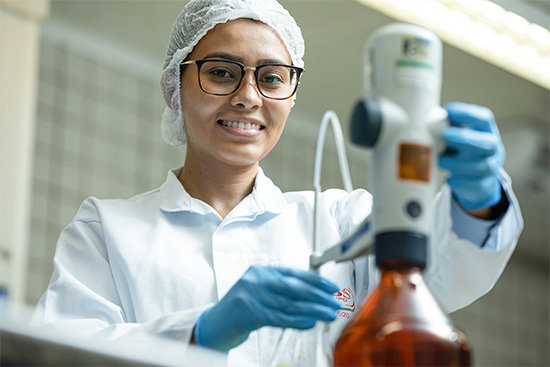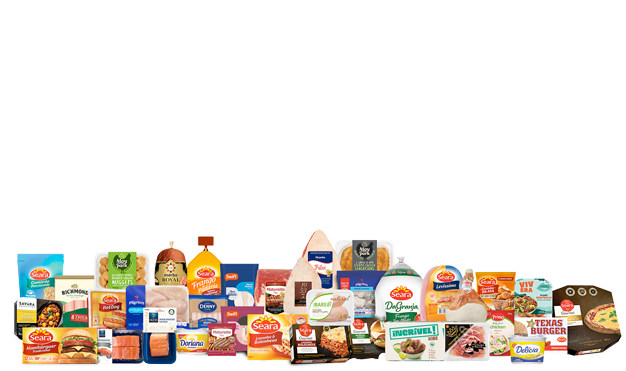Existing sterilization methods in food processing are water and energy intensive. In 2023, JBS Australia secured funding from AMPC to trial the “Econoliser” - a new method of sterilization seeking to significantly reduce water and energy consumption while ensuring equivalent food safety outcomes are achieved.
The unit operates by activating sprays that can remove residues such as fat, protein, and bacteria from knife blades. Trials were scheduled to commence in Q1 2024 at the JBS Brooklyn facility in Melbourne with operators using both the industry standard and the new electric Econoliser system sterilizers, side by side. Results of the trial were due to release in Q2 2024.
To meet the constantly evolving expectations of consumers, Seara implemented the Seara Innovation Hub. It is a structured innovation management process that monitors consumer needs and challenges, market opportunities, new ingredients, and technologies, applying them to the launch of new products.
Through this framework, consumer research is also conducted to capture new habits, challenges, and priorities. In 2023, the company invested R$ 56 million in research, development, and innovation. Improvements were identified through the Technological Gaps project, focused on process enhancement resulting in improved product perception by consumers. Additionally, scientific research was conducted in areas such as sustainable packaging, sensory methodologies, consumer-centric studies for key Seara categories, and industry 4.0. The strengthening of these actions resulted in the successful launch of 78 innovative products, with 38 introduced to the Brazilian market and 48 internationally. Furthermore, Seara conducted several consumer-centric innovation cases, especially in the Festive and Fresh Chicken categories, demonstrating a deep understanding of customer needs and preferences and strengthening its position in the food market.
In the protein cultivated-based space, JBS acquired a controlling stake in the Spanish company BioTech Foods, which owns commercially viable technology in this field.
Additionally, it will invest approximately US$ 60 million to build the first Research & Development (R&D) Center for Food Biotechnology and Cultivated Protein in Brazil and the JBS Biotech Innovation Center, located in Florianópolis (SC). The Company is focusing its efforts on constructing specialized facilities for the development of 100% national technology for cultivated protein production and the pilot plant, as well as acquiring the necessary inputs for research. With this center, the Company will develop new techniques to accelerate scale gains and reduce production costs of cultivated protein, anticipating its commercialization. We have an ethical committee for the use of animals in experiments related to cultivated meat, composed of animal welfare experts and representatives from reputable non- governmental organizations (NGOs).
In the United States, several of our beef plants partially transitioned to a zero-trim product (ZTP) in 2022. By removing excess fat – for example, the ½ inch on the edge of a steak – the customer doesn’t have to cut and throw it in trash or grill it to melt the fat.
It is instead collected at the facility and transformed into tallow. In addition to meeting consumer preferences for more convenient products, the initiative also helps eliminate food waste at home.
The JBS Process Improvement Team, in collaboration with Operations, has been developing the use of sensors to improve equipment reliability / predictive maintenance tools and the use of cameras to detect quality issues such as boning, value optimization, packaging compliance and dressing performance. These efforts are just now starting to evolve from data collection to actual usage applications.
In 2021, our beef facility in Brooks, Canada implemented a project to capture the quality of processed chuck line bone via artificial intelligence (AI) cameras, generating a score for each bone and qualifying each employee in terms of bone count and quality. In 2022, a daily bonus per employee was implemented based on daily delivery and validated by 3 parameters: quantity, quality, and audit. Ultimately, the project resulted in increased line yields, process standardization, and team member morale on the chuck line.
In partnership with Opal, JBS Australia won a WorldStar global packaging award for their innovative corrugated cardboard dunnage solution. Opal developed the innovative dunnage solution in collaboration with JBS to limit product movement during transportation, which can result in costly damage and food waste.
Dunnage is usually constructed from expanded polystyrene (EPS), which can’t be recycled and ends up in landfill. Opal’s dunnage is a column-like corrugated structure, and a sustainable, 100 per cent recyclable cardboard alternative to non-recyclable EPS.
Swift offers more than 500 product options under a commitment to deliver healthy, practical, and sustainably sourced products. The company has also developed an innovative freezing process that maintains the same tenderness, flavor, and texture as fresh products while improving food safety.
The Swift portfolio includes gourmet ready-to-eat meals, fruits, and vegetables, as well as frozen protein products.


